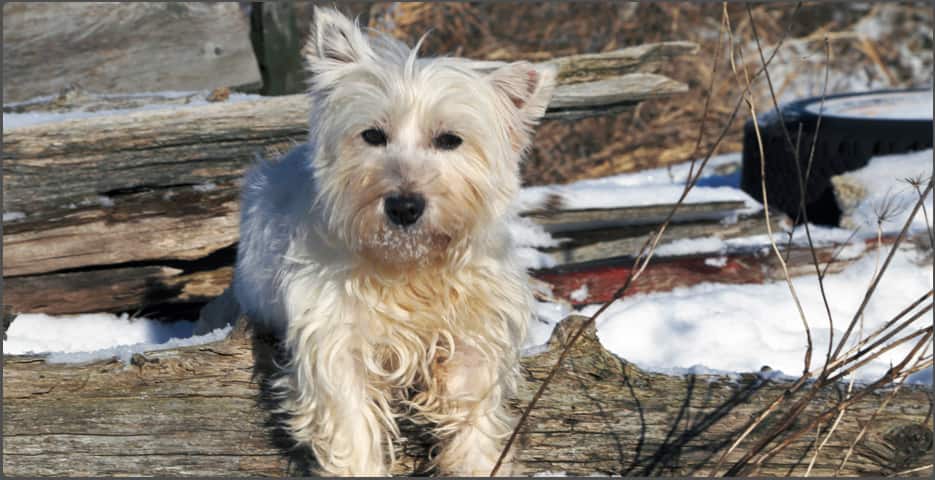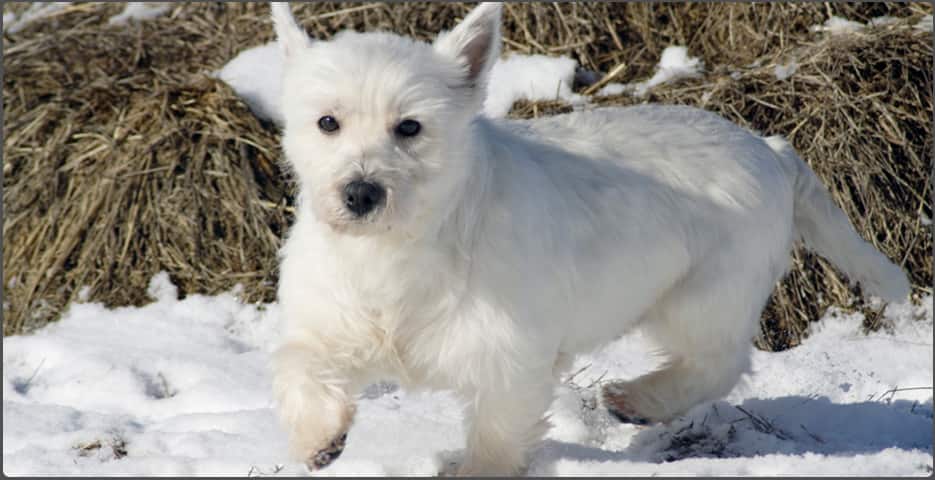Origin: Scotland
Date of Origin: early 1900’s
Class: terrier group
Height: 10-11 inches
Weight: 15-20 pounds
Colour: white
West Highland Terriers are independent, assured and confident dogs. They make good watchdogs. They are loyal to their owners and like to be social. They are a hardy breed and can be stubborn. Having a typical terrier prey drive, they tend to be highly interested in toys, especially chasing things. They are intelligent, quick to learn and good with children, but they do not always tolerate rough handling. Westies are great additions to any family size of home, even apartments. They are a hypoallergenic breed, so if you have allergies they could be a great choice for you.
Overall, Westies are a very healthy dog breed, but no matter what the breed, every dog can have health concerns. The main health issues associated with west highland terriers are as follows:
Luxating Patella’s
Luxating Patella’s are loose knee caps. The kneecap should sit in a groove in the center of the knee joint of the femur (upper leg bone). A luxating patella is a knee cap that moves out of the groove. It is also called a floating knee cap. Sometimes dogs can have a luxating patella and there are no symptoms or physical problems, while other needs therapy or even surgery. Our dogs are screened for luxating patella’s before they are bred.
Eyes
Westies can develop a number of different eye conditions, however dry eye is the most common eye problem. This is when the tear glands no longer produce enough tears to keep the eye moist which can result in sore eyes and infections. Treatment is with an ointment that gets applied daily. Our dogs are screened for eye problems before they are bred.
Hips & Legg-Calve Perthes
Westies are at risk for both of these problems. Hip dysplasia is when the joints develop improperly and can result in arthritis. X-rays can be taken to determine if your dog has hip dysplasia. If they do, they can be treated with arthritis medication. Surgery is also an option if it is severe. The more overweight the dog, the more likely they are to have arthritis years earlier than a dog at a healthy weight. Legg- Calve Perthes is a hip condition where the femoral head or ball develops necrosis or dies. This causes it to no longer function properly. Our dogs are screened for hip dysplasia and Legg-Calve Perthes before they are bred.
Craniomandibular Osteopathy (CMO)
Craniomandibular Osteopathy (CMO) is a bone disease that usually occurs when dogs are 3-6 months of age. It can cause dogs to have pain when opening their mouth. Treatment includes medications. Our dogs are screened for craniomandibular osteopathy before they are bred.
Allergies
Westies have sensitive skin and can have allergies to a host of things including certain foods, cleaners, etc. A common sign of a westie having a reaction is itchy skin. They may lick their paws, rub their face or get an ear infection. There are many treatment options available for dog allergies.
Dental Disease
This is one of the most common problems in all dogs. It affects 80% of dogs by age 2. It starts as tartar build up on their teeth and progresses to infection in the gums and rots the teeth. If it is not prevented or treated it can cause them to lose their teeth and be in danger of damaging their kidneys, liver, heart and joints. It can even shorten their lifespan. It is extremely important you brush your dog’s teeth. We brush all our dog’s teeth to ensure they have healthy gums.
For more information on these health problems or other west highland terrier health issues please visit Westie Health Issues (westiefoundation.org)



